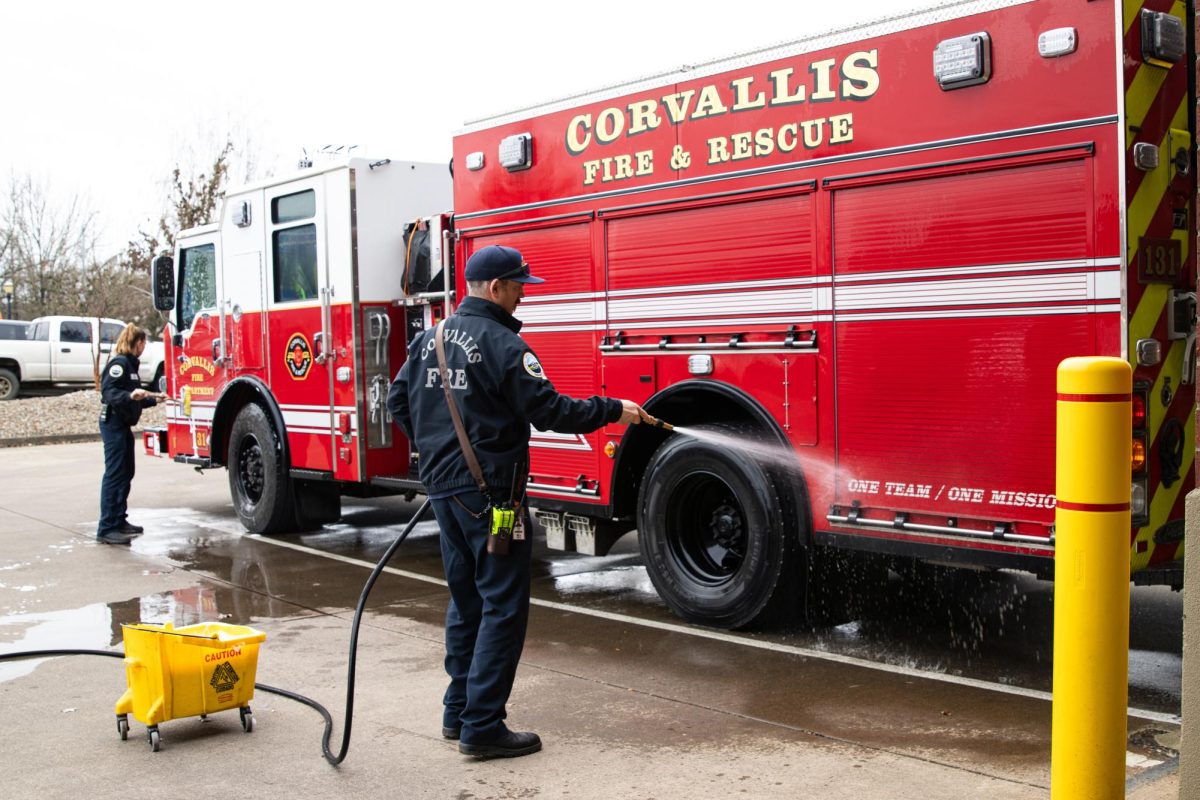ASOSU prepares for 2018-19 academic year
June 25, 2018
While many students take a summer to work, travel or explore other passions, the new leadership of the Associated Students of Oregon State University will be working to prepare for the academic year.
The student government, designed to mirror the U.S. federal government in some respects, is made up of an executive branch, a legislative branch and a judicial branch. The legislature is made up of a Senate and a House of Representatives, with senators serving two year terms and representatives only one.
Executive Branch
In the executive branch, one of ASOSU President Justin Bennett’s priorities over the summer is formalizing a relationship with TurboVote, an online portal used by some universities to help students register to vote and receive absentee ballots. A representative of the company reached out to the student government expressing an interest integrating the portal into MyOSU. In the meantime, a stand-in website could be set up by the end of fall term.
“During our voter registration drives we would encourage people to register through that portal,” Bennett said. “The other side of that is a lot of advertising to get the word out.”
Bennett also wants to train and prepare next year’s executive branch staff to begin their roles by the end of the summer. Each ASOSU president is given the power to staff their cabinet. Bennett, who served in last year’s executive branch, renamed his old position from director of government relations to legislative affairs. The responsibilities, working with the state and federal legislature to advocate for student issues, remain the same. The other four director-level positions are the directors of PR and marketing, diversity initiatives, community initiatives and the chief of staff.
Below these positions, there are assistant directors under legislative affairs and PR and marketing. There are also eight coordinator positions across a diversity team and a community team, Bennett explained. The diversity team is made up of coordinators for queer affairs, multicultural affairs, women’s affairs and international affairs. These roles are usually filled by individuals who identify as the identities served, but this is not a requirement for hiring.
“The diversity team offers representation to marginalized communities and act as liaisons into those communities,” Bennett said. “The community team deals with broader topics such as environmental issues.”
Legislative Branch
Aiden Tariku, who serves a dual role as vice president in the executive branch and president of the Senate, plans to hold Senate meetings to discuss legislation and confirm coordinator positions hired in the executive branch. Another summer project will be holding an internal election during the first meeting to elect a Senate president pro-tempore.
“The Senate pro-tempore presides over Senate in the absence of the vice president and will be delegated tasks that the vice president may need assistance with,” Tariku said in an email.
Beyond these legislative and administrative goals, Tariku stressed preparing the nine new senators in a chamber of 12 with information about their roles.
“I’m beyond thankful and excited to be working with such a worthy and dedicated group,” Tariku said via email. “They’ve already proven themselves to be passionate about the work they’ll be doing, and I’m not only excited to see what they all accomplish as student representatives, but as individuals.”
Tariku and Speaker of the House Carol Moreno split Congressional training over two days this summer. Moreno said one of the issues faced in previous years is representatives losing interest in the summer due to lack of interaction with the leadership and the rest of the chamber.
“A goal that Vice President Tariku and I set out for this year was to have more activities leading up to the inauguration in order to develop stronger relationships with members of Congress and to increase retention,” Moreno said via email. “In April, we held a Congressional social at the OSU challenge course.”
The first of the more formal trainings was already held in June, including a series of workshops on the history of the student government, its constitution, campus resources and how to properly format legislation. Moreno noted all members of Congress will be required to receive cultural competence training to prepare them to represent all students in the OSU community.
Another goal Moreno noted was a focus on updating the section of the ASOSU website regarding Congress.
“It is our hope that designing a new Congressional page will allow us to have biographies on senators and representatives, as well as a legislative folder that will allow the general public to easily access legislation,” Moreno said via email.
In addition to internal changes in her own branch, Moreno said she and the other leaders within ASOSU are working to improve integration between different branches.
“A challenge that many representatives expressed this last year was feeling rushed and ill-informed through our student fee process. At times, representatives would not see budget proposals until they were asked to vote on them,” Moreno said in an email. “This is something that we have already been working to improve through a series of Student Fee Committee improvement meetings.”
Student Fee Committee
SFC Chair Theresa Thurston echoed Moreno, citing the difficulties of previous cycles where concerns over fee levels were not reconciled between members of the SFC, which recommends the budgets, and Congress, which approves them. This led to budget levels not being passed and required differences to be worked out in a mediation process.
“This better preparation will include a more rigorous check to ensure students have the opportunity to access information, as well as an emphasis on attending the meetings, presentations, hearings and events that the SFC uses to inform itself on units, including unit presentations, SFC deliberation and open hearing,” Thurston said via email.
Thurston, who served as vice-chair last year, also intends to improve outreach with the student body through informational materials and an updated website.
“Although relatively small compared to tuition, student fees are not pocket change either,” Thurston said via email. “Being aware and involved in the process is an important opportunity for students to voice their concerns as well as learn more about the experiences possible for students on campus.”


















































































![Newspaper clipping from February 25, 1970 in the Daily Barometer showing an article written by Bob Allen, past Barometer Editor. This article was written to spotlight both the student body’s lack of participation with student government at the time in conjunction with their class representatives response. [It’s important to note ASOSU was not structured identically to today’s standards, likely having a president on behalf of each class work together as one entity as opposed to one president representing all classes.]](https://dailybaro.orangemedianetwork.com/wp-content/uploads/2025/03/Screenshot-2025-03-12-1.00.42-PM-e1741811160853.png)
























